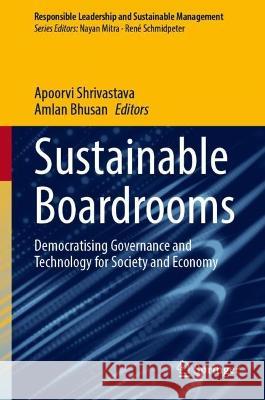Sustainable Boardrooms » książka
topmenu
Sustainable Boardrooms
ISBN-13: 9789819948369 / Angielski / Twarda / 2023
This book discusses various interactions in the sustainability and development sector. It presents a thematic approach to describe progressive models and cases on disruptions, innovations, regulatory and institutional evolution related to the area of sustainability, through an organizational and boardroom level governance lens. It documents how certain schools of thought, models of engagement and methods-platforms-practices impact society and while doing so, brings together varying theoretical debates, practicing models and instruments of transformation in green governance.
Sustainable policy making demands a whole of government approach in decision-making processes. Further, inclusiveness and ‘green’ consciousness of corporate boardrooms are paramount, without which, effective socially responsible business practices are absurd. Human resource development, shaped on sustainable corporate ethics, requires well-trained sustainability specialists, managers that can think ‘green’ in their overall decision making which are essential for green governance.
In this context, the book creates a functional, interpretive repertoire of stories, commentaries, life experiences, and reflections of corporate leaders, academics, and practicing consultants, on their decision-making processes, and how they interpret sustainability. These stories and thoughts help create a functional academic construct, which will assist academics teach ‘green’ competencies to business school students better, and entrepreneurs and business executives to better understand the idea of sustainable growth.











